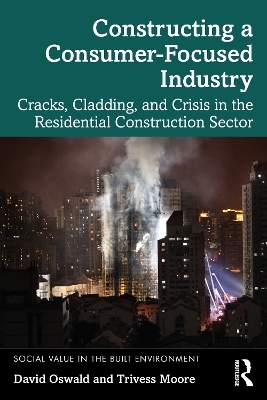
Constructing a Consumer-Focused Industry
Routledge (Verlag)
978-1-032-00731-1 (ISBN)
Too often there has been a lack of government and industry support to help the housing consumer through these issues or to prevent them from occurring to begin with. It is time for a rethink and restructure of government policy, support, and industry practices to better protect housing consumers and deliver high-quality and sustainable housing that creates social value.
Through evidence-based research and international case studies, this book focuses on the effects that dangerous defects have on the housing consumer. The ongoing construction cladding crisis is used as a primary case study throughout to highlight these implications, with other previous large-scale defect examples, such as leaky buildings and asbestos. Based upon the range of emerging evidence, we propose ideas for policy makers, construction and built environment professionals, owners corporations, and households on how to move forward towards a higher-quality, sustainable, and socially valuable way of residential living.
Government policy has long focused on ‘making industry work’ through building regulations and standards. It is now time for greater government and industry focus on the consumer to make ‘consumer protection work’ in the built environment. There is a need to prevent dangerous defects like combustible cladding, better support consumers when defects emerge, and to create buildings for social value rather than minimum standards. Now is the time to build a better future for the end-user.
Dr. David Oswald is a Senior Lecturer and Deputy Program Manager in the School of Property, Construction and Project Management at RMIT University in Australia. He is a journal editor, reviewer, and PhD examiner and has written multiple award-winning academic publications within construction and the built environment. His recent combustible cladding research with Dr. Moore was used in Victorian parliament (Australia) to demonstrate the need for improving homeowner consumer protection. Dr. Trivess Moore is a Senior Lecturer in the School of Property, Construction and Project Management at RMIT University in Australia. His research relates to housing quality and performance and focuses on the intersection between technical performance, liveability, social impact, and policy. In addition to recent work with Dr. Oswald on combustible cladding, he has been undertaking research looking at retrofit and the circular economy in Australia.
1. Cracks, cladding and crisis in the residential sector, 2. Building defects: considering the human cost, 3. Homeowner vulnerability: dangerous defects, 4. The real cost? Well-being implications for the consumer, 5. Corporate social responsibility for the consumer, 6. Dealing with dangerous defects in multiple occupancy developments, 7. Navigating landlord-tenant conflicts, 8. Government support during times of crisis, 9. Designing and building better for the housing consumer, 10. Conclusions
| Erscheinungsdatum | 26.05.2022 |
|---|---|
| Reihe/Serie | Social Value in the Built Environment |
| Zusatzinfo | 4 Tables, black and white; 2 Line drawings, black and white; 2 Illustrations, black and white |
| Verlagsort | London |
| Sprache | englisch |
| Maße | 156 x 234 mm |
| Gewicht | 453 g |
| Themenwelt | Naturwissenschaften ► Biologie ► Ökologie / Naturschutz |
| Technik ► Bauwesen | |
| ISBN-10 | 1-032-00731-1 / 1032007311 |
| ISBN-13 | 978-1-032-00731-1 / 9781032007311 |
| Zustand | Neuware |
| Informationen gemäß Produktsicherheitsverordnung (GPSR) | |
| Haben Sie eine Frage zum Produkt? |
aus dem Bereich


